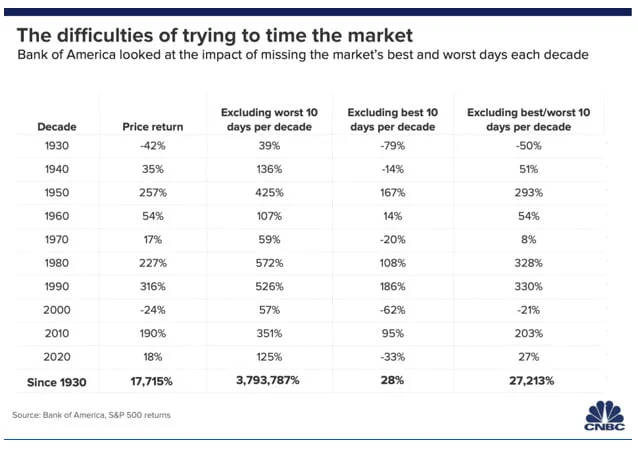Investors can’t help but wonder, “Trick or treat?” as US stock markets rally and a lower likelihood of a US recession erupts, which suggests inflation is plateauing. Indian market to is a bit volatile, with a fall in oil prices (due to the emerging COVID curbs in China) leading to FPIs investing nearly $1 billion back into the Indian stock market.
The markets often play games of Trick or Treat on investors, which can be unnerving. In times like these erratic circumstances, investors likely tend to pull out or put off investing until the market is less erratic. But given that market volatility will always exist to some extent, achieving your investment objectives will be more challenging if you decide to stop investing whenever stock prices decline.
Why should you continue investing despite volatility?
Looking at the data below, which dates back to 1930, it was discovered that total returns would be significantly lower for investors who chose to wait it out than for those who chose to miss the S&P 500’s 10 best days in each decade. Keep in mind these are a mere 10 days in a decade that swing the difference in gains.

A historical check of each recession’s best days and highest returns proves that the best days for investors typically come after the biggest drops in the market. This can be translated as panic selling, likely resulting in missed opportunities for gains. Instead, regardless of what the market does, it is best to continue making consistent investments. This technique, known as rupee-cost averaging, can lessen the effect of volatility on your investments. Here are 3 things to avoid, especially during volatile markets:
- Selling your investments in a panic
- Stopping investments (including SIPs) altogether
- Investing in subpar stocks merely because they’re on sale
Avoid these missteps to ensure you make the most of the mark
et volatility. On the other hand, here is what you should do:
You could choose to filter your debts by tackling and clearing higher value loan amounts, higher tenures or higher interest rates. Here is where it can get a little tricky and hence a clear understanding of your debts and its clauses is required.
Build Wealth
There is no way to avoid the market’s volatility altogether. Although, what you can avoid is making decisions that could harm your long-term savings. You can give your investments the best chance of surviving market volatility by investing in high-quality stocks and holding them for a long time. Although keeping your money in the market during times of volatility may seem counterintuitive, it’s far safer than converting notional losses into real ones. While you wait for the market to recover, your portfolio’s short-term performance might suffer. But you should be able to weather the storm if you continue to hold a well-diversified set of stocks.
Asset Allocation
If equity’s volatility makes you nervous, you could diversify your investments into fixed-income and other debt instruments. By doing so, you can gradually transition into equity when the markets stabilize. The proper asset allocation is essential for a well-diversified portfolio that can weather any market storm. A good mix of large-cap, mid-cap, or small-cap investments, including bonds and across commodities, should help keep your portfolio well-diversified and afloat during sudden market plunges.
A long-term perspective is essential when investing, with a focus on the next five years. And it is when the investment climate appears to be the darkest, look to invest in proven, high-quality businesses.


Leave a Comment